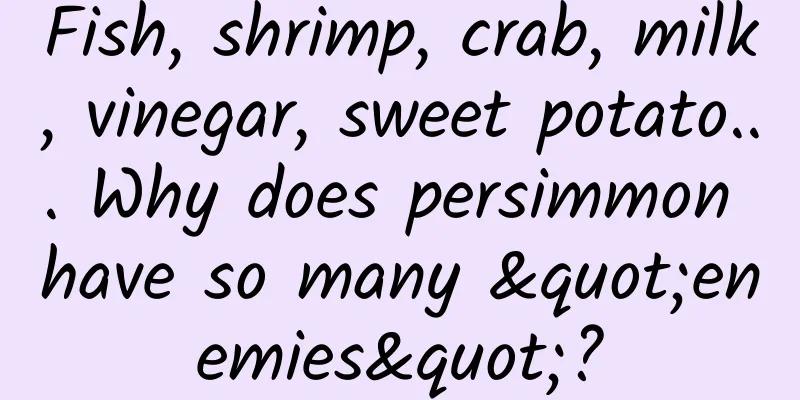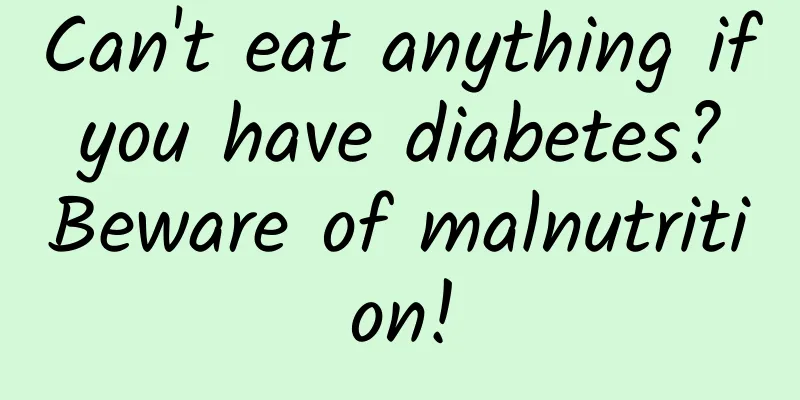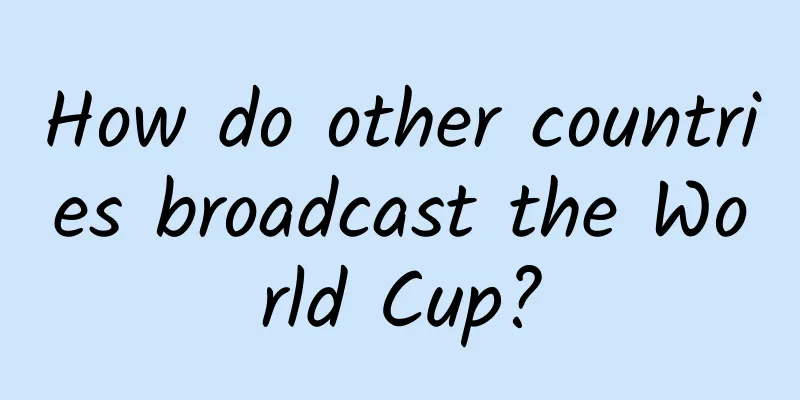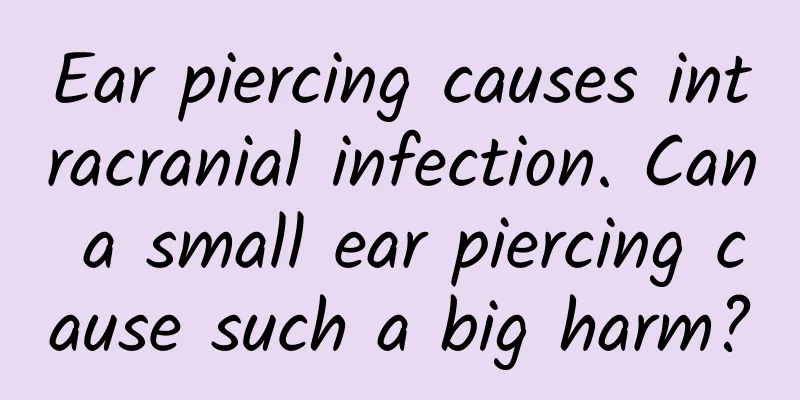Fish, shrimp, crab, milk, vinegar, sweet potato... Why does persimmon have so many "enemies"?

|
"Persimmons cannot be eaten with fish, shrimp, crab, milk, vinegar, sweet potatoes, etc." There are various sayings about eating persimmons: you cannot eat persimmons on an empty stomach; you cannot eat persimmons with fish, shrimp, crab, milk, vinegar, sweet potatoes, etc. Otherwise, you may develop stomach stones. Rumor Analysis This statement is not rigorous. The cause of gastric stones is the tannin in astringent persimmons. The persimmons on the market have been de-astringent, so they can be eaten normally by the general population without much worry. As for the unripe persimmons picked by yourself, they are not delicious and are not recommended for consumption. It is the season for persimmons to be on the market again, and many people have begun to enjoy the sweet and delicious persimmons. However, there are often various sayings about eating persimmons: A merchant's "warm reminder" about eating persimmons What's the problem with persimmons? Why do people always say that persimmons can cause stones? Can we still eat persimmons without worry? What’s wrong with persimmons? Although persimmons are delicious, there are indeed many versions of saying that they can cause stones, and the reason is ultimately attributed to the fact that they contain a component called "tannic acid". Tannic acid, also known as tannin, has the biggest characteristic of being astringent, so some people feel "astringent" on their tongues when eating persimmons, which is actually the effect of tannic acid. Tannic acid is very common in the plant kingdom and exists in many fruits and vegetables. In addition to persimmons, we usually eat grapes, hawthorns, pomegranates and other fruits, we usually eat eggplants, spinach and other vegetables, and drink tea, which are rich in tannic acid. Under certain conditions, tannic acid can combine with protein to form a precipitate with larger molecules and insoluble in water - tannic acid protein. When there is more gastric acid in the stomach, tannic acid protein will combine with pectin, cellulose, etc. in the food to bond the persimmon peel and persimmon core together, quickly forming gastric stones in the stomach, also called gastric persimmon stones, and causing stomach discomfort. This is also the theoretical basis for saying that persimmons can cause stones. So, does this mean that we really can't eat persimmons? Can I eat persimmons? In fact, the tannic acid in persimmons is not as terrible as everyone worries. First of all, ripe and sweet persimmons have very little tannic acid. The tannic acid content in different persimmons is different, generally between 0.4% and 4%, which can differ by up to ten times. When persimmons are not ripe, the tannic acid content is high, especially in the outer layer of the flesh - that is, near the persimmon skin, where tannic acid is distributed more, but when they are ripe, there is very little tannic acid. To judge whether the tannic acid content of persimmons is high, you can use the simplest method - tongue. If it tastes very astringent, it means that the tannic acid content is high. Generally speaking, the tannic acid content of sweet persimmons is very low after they are ripe. Secondly, the persimmons sold on the market now have been de-astringent and the tannic acid content is very low. Copyrighted stock images, no reproduction is authorized At present, the commercialized persimmons that we can buy on the market must go through a step of "de-astringency" treatment before they can be sold on the market. After all, if the taste is too astringent, consumers will not buy it, and merchants will not sell it. As long as it has been de-astringent, the tannic acid content is very low, so you don't have to worry too much about causing stones, and you can buy it with confidence. However, if you go to some mountains to pick persimmons yourself, or buy some so-called home-grown persimmons, it is very likely that they have not been de-astringent, especially unripe persimmons, the taste will be more astringent, and the tannic acid content will be higher. In general, persimmons may indeed contain tannic acid, but as long as you buy regular persimmons or fully ripe persimmons, there is very little tannic acid, and you can eat it with confidence. Are those taboo legends about persimmons true? Since persimmons contain tannic acid, there have been many taboos about eating persimmons, such as not eating persimmons on an empty stomach, not eating persimmons with crabs or milk, etc. Can we really believe them? 1. Can’t eat persimmons on an empty stomach? If you eat a lot of persimmons with high tannin content on an empty stomach, there is indeed a risk of causing gastric stones. But most of the persimmons we buy now are sweet persimmons or artificially de-astringent persimmons, with low tannin content, so they can be eaten with confidence. Moreover, even if the tannin content is really high, for normal people, you usually don’t have to worry about eating a lot on an empty stomach and causing stones. Because the typical characteristic of tannin is that it tastes very astringent, persimmons with high tannin content will taste particularly astringent and not delicious. Normal people will spit out after taking a bite, and will not eat a lot, so naturally there is no need to worry about causing stones. It should be reminded that some elderly people, children, etc. usually have weak gastrointestinal functions, and eating persimmons on an empty stomach may easily cause discomfort. You should pay attention to their reactions after eating persimmons. If they express discomfort in the gastrointestinal tract after eating, then don’t eat it. 2. Persimmons cannot be eaten with sweet potatoes and crabs? The reason why sweet potatoes and crabs cannot be eaten together is that the high sugar content of sweet potatoes will combine with tannic acid, and the high protein content of crabs will combine with tannic acid, and the reaction will produce precipitation and lumps, leading to stones. In fact, these statements are common routines of food incompatibility, and there is no need to worry. Because as long as the persimmons that have been de-astringent are eaten, there is very little tannic acid, and this tannic acid and protein will not produce much precipitation. Food incompatibility is also a legend without scientific basis. Therefore, persimmons can be eaten with sweet potatoes and crabs, and can be eaten with other foods such as yogurt, milk, chicken, etc. 3. You can’t eat vinegar or drink milk before eating persimmons? These statements are all routine statements about food incompatibility. In fact, there is no such thing as food incompatibility in nutrition, and it is recommended that everyone pay attention to food diversification in their diet and try to make their diet balanced and diverse. Which one should you choose, crisp persimmon or soft persimmon? There are soft and crisp persimmons on the market. What is the difference between soft and crisp persimmons? Which one is better? The biggest difference between soft and crisp persimmons is the different forms of pectin in the flesh. Pectin is a polysaccharide present in the cell walls of all higher plants. It cross-links with cellulose, hemicellulose, lignin and protein in plant tissues to make the cell tissue structure strong and present a relatively hard shape. However, during the ripening process of the fruit, pectin will be degraded by the action of pectinase, and the fruit will become soft. Unripe fruits contain protopectin, which gradually turns into pectin as they mature, and finally the pectin is broken down as the fruit ripens. The ripe and crisp persimmons we buy in the market are either sweet persimmons and can automatically remove the astringency without becoming soft during the natural ripening process. Another situation is that the activity of pectinase is inhibited during the artificial removal of astringency, so that the pectin will not be decomposed, so the persimmons are still crisp. Although the taste and texture of soft persimmons and crisp persimmons are very different, there is no difference in nutritional content. As for which one is better, crisp persimmons or soft persimmons, it is really a matter of personal preference. If you like a crisp taste, eat crisp persimmons, and if you like sweet and soft, eat soft persimmons. How to eat persimmons safely? Persimmons are a delicious fruit in the golden autumn season. Don't miss out on this delicious fruit because of some rumors. How can you eat persimmons safely? Here are some tips for you to pay attention to: 1. To determine whether persimmons are edible, you can taste them. As long as they are not astringent, it means that the tannic acid content is not high and you can eat them without worry. 2. Commercial persimmons sold in an official manner have all been de-astringent and have a very low tannic acid content, so they can be eaten with confidence. 3. Do not buy or eat persimmons sold on the roadside or so-called home-grown persimmons, as they may not have been de-astringent. 4. Unripe persimmons have a high tannic acid content, so it is best not to eat them on an empty stomach. Try to wait until they are ripe before eating them. 5. People with excessive gastric acid secretion and poor gastric motility, or people suffering from stomach diseases such as gastric ulcers, should try not to eat astringent, unripe persimmons. 6. Pay attention to your feelings. If you often feel stomach discomfort every time you eat persimmons, it is recommended that you go to the hospital to check whether you have gastrointestinal diseases to avoid delaying the treatment. Looking in the mirror of rumors Foods contain different ingredients at different stages of maturity. We should pay attention to the risks of unripe fruits, but we should not be deterred from eating safe ripe fruits. Author: Ruan Guangfeng, Deputy Director of Kexin Food and Health Information Exchange Center Review|Zhang Yu, researcher/PhD, Chinese Center for Disease Control and Prevention, national health science expert |
Recommend
Arrange a tea party in Nanjing and find Xiao Wang
Nanjing tea drinking studio arrangement, Nanjing ...
“Zhangyue” short video operation skills!
In this article, the author will explore the oper...
Sina Weibo's nine-square grid, you say it's not good before you even understand it?
CPs are all familiar with the nine-square grid on...
DingTalk is aggressively grabbing the TO B digital office market. Are Enterprise WeChat, Kingdee, Graphite Docs, Maimai and others in danger?
On the evening of December 9, DingTalk held a gra...
7 Predictions for Metaverse Immersive Marketing
According to the first principles, the biggest me...
The three Internet marketing crazes I experienced!
As someone who makes a living from management, in...
Why can curved screens replace straight screens and become the symbol of high-end phones?
As a practitioner in the digital industry, I can ...
People are celebrating my festival, and I'm in chains
Today's push is quite special Please rotate y...
Wang Hong becomes a hot candidate for the Fields Medal. Why is the Kakeya conjecture so important?
A hundred years ago, Japanese mathematician Soich...
Which cities have the most universities? Ranking of cities with the most universities in 2020
In recent years, China's education has develo...
6 rules for making your brand a hit!
"The Breaking Bad" talks about how the ...
"91 Ten Articles" - A daily must-read briefing for the new energy vehicle industry (210208)
1. SAIC Group announced that its sales of new ene...
Why are brands rushing to collaborate across industries?
1. Conclusion I’m afraid you’ll think I’m being t...
Retention rate? Several classic methods to keep more users!
An APP and its users will go through four stages:...
Ferrari hybrid supercar LaFerrari will be mass-produced in 5 years with 10,000 units
Ferrari has always been synonymous with top-level...









